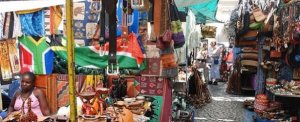The Informal Economy: Cape Town Entrepreneurs
Over the last almost two weeks in Cape Town, one thing that has struck me as very different from the United States is the structure of local business. Many of these businesses are very informal and take place in the form of a market, where several people set up shops and sell their clothing and other souvenir items. In the year 2000, the GDP was 28.4% made up from the informal sector, and in 2007 it employed 18.5% of the total employment of South Africa (Blaauw).
While walking around Cape Town, it’s easy to notice that there is definitely a mixture of types of businesses – from the big companies like ABSA, to smaller mom-and-pop stores and restaurants. But there is also this large undeniable informal sector of Cape Town Entrepreneurs. It’s been amazing to see so many different types of entrepreneurs and what they’re selling or doing to try and earn a living. This is likely because of the very high unemployment rate, which is above 25% (statssa.gov). People all over Cape Town are doing whatever they can, and using whatever resources they have, to create some sort of income.
Some of the interesting entrepreneurs that I have seen so far are:
- All of the vendors at the market
- People performing/doing tricks for money
- Selling snacks and candy on the trains
- Offering tours of Cape Town
What’s so interesting is that it’s not the typical American entrepreneur who wears a suit every day and creates a company that sells mass products or services. It’s one person who is trying to support their family to be able to make a life for their children so that they can be educated and get a better paying job. It’s not because they don’t want to work in a cubicle or “be their own boss,” but it’s because no one will hire them. They make the best of their circumstances to provide for their families.
One of the major areas of entrepreneurship in the Cape Town area is art; at the marketplace there are many stations that claim to sell “original pieces.” The problem with this is that many of these pieces are not original, but rather imported from China. Instead of encouraging people to sell imported products, the local economy should encourage selling truly local and handmade art. This would help people become artists and sell their own work that they have a passion for, rather than selling something just to make a living.
An example of a local business that is striving to change the way local artists work is “Monkey Biz,” a local store that we traveled to as a class. They empower artists by giving them beading material and then buying back their art pieces. This encourages artists to be artists, rather than salespeople selling something that they don’t believe in. If the local economy can push this trend, then art truly can change the economy of South Africa and the lives of its people!
Works Cited:
Work & Labour Force. (n.d.). Retrieved January 16, 2015, from http://beta2.statssa.gov.za/?page_id=737&id=1
Blaauw, D. (2011, October 12). The Informal Sector: An African Perspective. Retrieved January 16, 2015, from http://www.thedti.gov.za/sme_development/sumit/Informal sector an African perspective Prof Derick Blaauw.pdf

